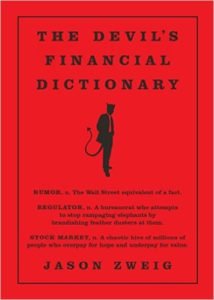 Like most closed shops, the financial industry features its own specialized vocabulary. As an investor, the key to understanding the financial industry is to understand the buzzwords and special terminology that are as often used to obfuscate concepts as to illuminate investors.
Like most closed shops, the financial industry features its own specialized vocabulary. As an investor, the key to understanding the financial industry is to understand the buzzwords and special terminology that are as often used to obfuscate concepts as to illuminate investors.
All of which makes Jason Zweig’s The Devil’s Financial Dictionary an invaluable tool for serious investors. Zweig is of course the Wall Street Journal’s eminent personal finance columnist. The book, published late in 2015, was inspired by Ambrose Bierce’s classic book, The Devil’s Dictionary.
As Zweig writes in his book’s introduction, “If investors are to be partners instead of pigeons, they must master the many ways in which Wall Street uses language to conceal rather than reveal information. Every profession is a conspiracy against the laity, and every profession’s jargon is meant to confuse and exclude those who aren’t part of the guild.”
If you learn nothing else, consider the following pithy observation by Zweig:
The denser the jargon, and the more polysyllabic the terminology, the more likely someone is hiding something from you.
Arranged alphabetically, as one would expect of a dictionary, this is a book you can peruse randomly; in fact, I’d suggest that approach. Without further ado, here are some sample definitions that got my attention and/or made me chuckle: as you’ll see, many of the definitions are simultaneously amusing and yet useful in penetrating the true meaning of many financial terms. They’re also quite cynical, which is half the fun: I’m sure Zweig had a blast writing them up in the first place.
ANALYST, n. A purported expert on a company who in theory estimates its value by breaking it down into its constituent parts but in practice functions as a salesperson and cheerleader.
CREDIT CARD, n. A thin slab of plastic that enables a person to feel pleasure today by incurring pain tomorrow.
DATA, n. The raw material from which Wall Street fabricates distortions for marketing purposes.
DAY TRADER, n. See IDIOT.
HOT, adj. Formerly hot. As surely as the sun will set in the west, investors will be offered the chance to buy a hot asset only as it is about to turn cold.
IRRATIONAL, adj. A word you use to describe any investor other than yourself.
LONG-TERM, adj. On Wall Street, a phrase used to describe a period that beings approximately thirty seconds from now and ends, at most, a few weeks from now.
MARKET MAVEN, n. From the Yiddish and Hebrew mavin, or “understand”; someone who does not know what will happen, but who does know how to sound like someone who knows.
NEWS, n. Noise: the sound of chaos; the reason the prices of investments move, the lifeblood of traders; often, the bane of investors.
PROFESSIONAL, adj. and n. On Wall Street, someone who acts like an amateur with other people’s money.
RUMOR, n. The Wall Street equivalent of a fact.
SELL, v. What Wall Street analysts say investors should almost never do, regardless of a stock’s price or market conditions. See also BUY.


